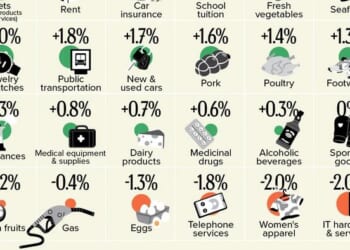
Normally a loyal Trump toady, Boebert did not flip. In fact, according to the New York Times, the White House’s threatening reminders of how popular the president is in her district “caused Ms. Boebert to dig in and more seriously entertain the possibility of a real conspiracy at play to cover up what is in the Epstein files.”
It does seem like a cover-up is afoot, doesn’t it? Enough so that even conspiratorial populists like Boebert, who’ve spent 10 years seeing elite corruption everywhere except in Trump’s own conduct, are struggling to ignore what’s in front of their faces.
A House vote on the bill has now been tentatively scheduled. If it passes, there’s a real chance it will do so with the support of dozens of GOPers who declined to sign the petition but now realize there’s more to lose politically by opposing it than there is to gain. And if that happens, John Thune and the Republicans of the Duma’s upper chamber will for once be tempted to use their own power to accomplish something meaningful that they know the czar won’t like, passing the bill and sending it to his desk.
Is Donald Trump’s party about to dump the Epstein crisis in his lap?
Bad timing.
I wonder if Mike Johnson regrets having kept the House out of session for so long.
The speaker sent everyone home after his chamber passed a government funding bill in September, jamming the Senate with a “take it or leave it” gambit to put pressure on them to approve the House bill and avert a shutdown. But closing up shop also gave Johnson an excuse to avoid swearing in Democrat Adelita Grijalva, who won a special election in Arizona more than seven weeks ago and had promised to supply the 218th signature on the Epstein discharge petition.
As long as Grijalva wasn’t officially a member of the House, she couldn’t sign the petition. Which made this the second time that the speaker has organized the House schedule around avoiding business related to Jeffrey Epstein.
Johnson may have calculated that stalling would give Trump time to work on Boebert and Mace to rescind their support of the Epstein petition before Grijalva could put it over the top. If so, it wasn’t crazy for him to think that a shutdown engineered by Democrats would drive Americans—especially Republicans—to rally around their president, which might make Boebert and Mace reluctant to take sides against Trump in the Epstein matter.
But it hasn’t worked out that way. The president’s job approval dropped 3 full points in less than a month, roughly coinciding with public anxiety about SNAP benefits being cut off. Polling during the shutdown consistently showed that the public blamed Trump and his party more than the Democrats for the crisis, and one survey conducted last week found 16 percent of Trump voters now saying they regret having cast their ballot for him last year. When asked why, the most common responses featured the words “government” and/or “shutdown.”
Today, the president has less, not more, political capital than he had before Democrats turned the lights off. If there was any doubt about that, last week’s election results erased it.
Meanwhile, the Epstein crisis has gotten worse for him. The emails I wrote about yesterday turned out to be the first in a bigger batch released by House Democrats, in which America’s most notorious pedophile cast aspersions on America’s most notorious president. Epstein claimed to have photos of Trump “with girls in bikinis in my kitchen” and told one powerful friend, “i know how dirty donald is.” He called his former friend a “maniac” with “not one decent cell in his body” and said to another correspondent, “i am the one able to take him down.”
As that was playing out, reports circulated that Ghislaine Maxwell, Epstein’s chief accomplice, is receiving a curious number of special privileges in the cushy new minimum-security federal penitentiary she’s been housed at ever since she told Deputy Attorney General Todd Blanche in an interview that—surprise—she never saw Trump do anything improper. Democratic members of the House Judiciary Committee alleged a few days ago that not only is Maxwell preparing to ask Trump to commute her prison sentence, for some reason her warden is assisting her with her application.
And so we’re left to wonder: What might have happened had Johnson kept the House in session, sworn in Grijalva promptly, and let the Epstein bill come to the floor in September?
Maybe a pre-shutdown, pre-election Trump would have scared Mace into withdrawing her signature, pointing out that Republican gubernatorial candidates tend not to do well in primaries when the president is mad at them. Even if the bill had reached the floor, it might have passed by only a bare majority instead of the forceful majority it’s likely to attract now that his popular support has weakened and the stench of suspicion around him over Epstein has grown overpowering.
Then, when the bill reached the Senate, it probably would have been voted down by Republicans. Trump would have called in favors from his loyal servants in the Duma to deny Democrats the 60 votes they’d need to pass it and, given his comparatively strong political position at the time, they likely would have complied.
I’m not so sure they’ll comply now. Post-shutdown and post-election, Senate Republicans have good reasons to pass the House bill, send it to Trump for signature, and force him into one of the most politically painful moments of his nearly five years as president. They can make him take full, exclusive responsibility for suppressing a major scandal in which he’s a main character by daring him to veto the release of the Epstein files.
Permission structure.
Both wings of the Senate GOP have a near-term incentive to do so.
The Epstein matter has become an albatross for the party. Trump’s net job approval on handling the case is 39 points underwater, more than twice as bad as his rating on tariffs and trade policy. Fewer than half of Republicans approve of how he’s handled the issue, a dearth of confidence in his leadership by the American right that may be unprecedented since 2015. Normally, helping the president do his dirty work is a can’t-miss path to populist credibility for Republican legislators who are ever eager to ingratiate themselves to their party’s base. Not this time.
In fact, Epstein may be the only subject besides immigration on which MAGA voters have firm substantive priorities that supersede Trump’s own political needs. To deny them the truth about a conspiracy among rich, powerful perverts is to strike at the heart of populism, abetting a cover-up of elite corruption that the swamp-draining Trump insurgency of 2016 was supposed to expose. Whether you’re an ambitious nationalist like Josh Hawley or an ambitious conservative like Ted Cruz, why piss off those voters by aligning yourself with the dissolute elite—and their presidential ally—instead of voting to release the files?
Why not seize a rare opportunity to damage Donald Trump without incurring the wrath of the Republican base?
Both wings of the party also have a longer-term strategic incentive to do so. For postliberals, the post-Trump era might arrive early as the president’s national support sinks. At 41.8 percent approval, he’s perilously close to the political “Mendoza Line”; if inflation picks up, if job growth slows, if he talks himself into a war with Venezuela that proves messier than expected, one can imagine him sinking below 40 and triggering an excited “lame duck” response. Figures on his right flank like Greene, Tucker Carlson, and Nick Fuentes will grow bolder in criticizing him, hoping to lure Republicans disappointed by Trump’s failures toward radicalism ahead of 2028.
They’ll never admit it, but they’d love to see the president wounded in a way that would make it easy to argue that he wasn’t ruthless enough. The Epstein mess is practically heaven-sent for that purpose. If your post-Trump pitch to the right will be that real populism has never been tried, you can’t do better to illustrate the point than having him run interference for America’s cabal of ruling-class pedophiles, of which the president himself may or may not have been a prominent member.
It’s not just postliberals who stand to benefit, though. Traditional conservatives are also looking ahead to 2028 and hoping to make a comeback, which partly explains why they’ve been so vocal lately in denouncing Carlson and Fuentes for antisemitism. For moral and ideological reasons, Reaganites don’t want a party dominated by militant reactionaries for whom Donald Trump wasn’t sufficiently bigoted or autocratic. But there’s a problem: As Cruz learned the hard way in the 2016 primary, the grassroots right is more populist than it is conservative. People like him will be at a disadvantage in the coming battle for hearts and minds against the Lindberghian faction if they don’t bank populist brownie points whenever they can.
The Epstein matter is heaven-sent for them too. If you want to show the right that they don’t need to nominate Tucker Carlson for president to ensure that a Republican White House will expose predatory elites, voting yes on the House bill to release the DOJ’s files is just what you’d do. It’s surely what I would do if I were Ted Cruz—especially knowing how much political cover I’m likely to get on defying Trump from the many House Republicans who will probably also vote yes.
There’s another component that senators should consider in deciding how to vote on releasing the Epstein files. Although one should never bet against the cultishness of the modern Republican voter, it’s possible that a deepening Epstein scandal will create a “permission structure” for rank-and-file GOPers to finally begin questioning their leader about all sorts of things, not just his relationship with his old friend Jeffrey.
The day will come when it’s no longer taboo on the right to speak discouragingly about Trump. I’ve always assumed that it wouldn’t arrive until after he’s dead, but I could be wrong. As more obnoxious strains of nationalism metastasize and reassure his fans that populism will continue to dominate the party even if the president falters politically, it stands to reason that those fans might grow more comfortable challenging him on his failures.
There’s no logical reason that right-wing anger over the Epstein files should make, say, right-wing opposition to war with Venezuela more likely—but it might. Once Trump has inadvertently given supporters cause to doubt the seriousness of his commitment to populism or even (gasp) his basic good character, that doubt might spread in unexpected directions. We may yet live long enough to see him derided by prominent capos in his own revolutionary movement as part of the “uniparty,” assimilated by the ancien régime.
Distance.
So if you’re a Republican senator, why not vote for the House’s Epstein bill and send it to Trump’s desk? Let him own the decision on whether the files are released or not.
There’s no downside. If he signs the bill, he’ll do so only because he’s confident that there’s nothing truly damning in the DOJ’s records about him. (Spoiler: Judging by his behavior over the last six months, he is very much not confident.) If he vetoes it, you get to dismiss future revelations about the Trump-Epstein relationship of the sort we’ve seen this week with, “What do you want from me? I voted to release the files.”
That sure beats having to nervously split hairs about the difference between pedophilia and ephebophilia, no?
And of course, Trump will veto the bill. Ultimately, what the Justice Department knows about all of this won’t be shared with the public. If Senate Republicans are nervous that passing the House legislation might blow up in their faces by exposing an unspinnably sordid Trump scandal, they should rest easy. He won’t let that happen.
Voting yes is also a hedge against disgraces yet to come. Given the depths to which the president has already stooped in issuing corrupt acts of clemency, it seems likely that he’s going to commute Maxwell’s sentence at some point. If Republicans are lucky, it won’t happen until after the midterms. But if there really is some unholy quid pro quo shaping up between her and the White House in which she gets released early in exchange for exonerating Trump, he might not have the luxury of delaying. Epstein’s procurer might not be willing to wait another year for her freedom.
When a reporter sticks a camera in your face on your way into the Senate chamber and asks what you think about Trump springing America’s most infamous living child abuser from prison, you’ll want to be able to look them in the eye and say, “You know that I voted to release the files, right?”
You might also take heart from the fact that the president won’t be able to punish you for disloyalty the way he usually can. There’s strength in numbers, for one thing: The more Republicans there are in both chambers who vote in favor of the Epstein bill, the harder it’ll be for Trump to target anyone. Even if he wanted to do so, how would it work? Imagine him running ads in a GOP primary attacking the incumbent for wanting to … expose the truth about Jeffrey Epstein.
Besides, anyone who votes against him in this matter will have ample opportunities to make it up to him later. Eventually he’ll want to declare martial law in some left-wing city or start droning drug dealers on U.S. soil or shutting down newspapers or what have you, and all Senate Republicans will need to do to get back in his good graces is … nothing. Which they’re great at. They didn’t become a Duma by accident, you know.
Until then, though, they’d be fools not to seize a chance to put some distance between themselves and an unpopular leader whose unpopularity is likely to grow knowing that, for once, the fanatic right-wing base won’t fault them for doing so. All we need is 13 Republicans to join hands with Democrats to pass the bill and force Trump to issue an Epstein veto. I think we’ll have them.

















